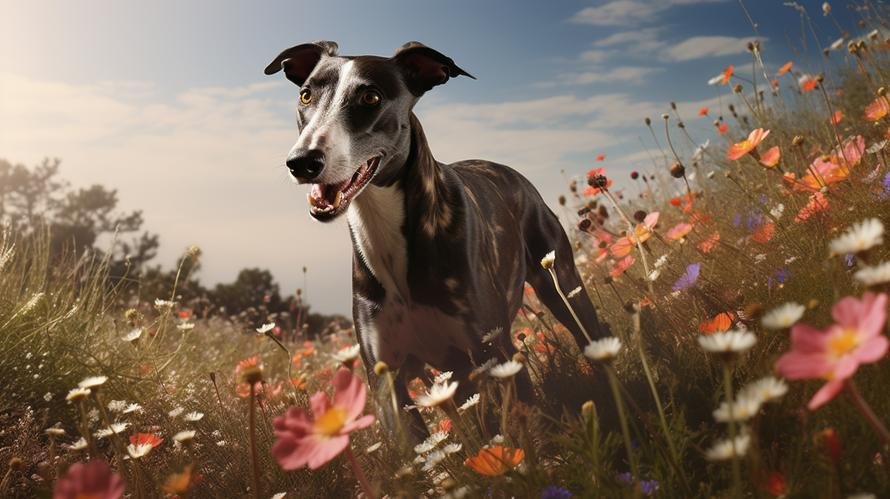The ripple of muscles beneath a shimmering coat of grey. The quiet confidence in its stance. The piercing, intelligent gaze of soulful eyes. It’s not hard to see why the greyhound has long been admired not just for its speed, but its sheer physical beauty. Did you know that greyhounds are so fast that they were originally bred for hunting? They could outrun the prey, even if it was a deer or a hare! Then later, they became popular racing dogs, known for their grace and thrilling speed on the track. That’s some interesting canine history, isn’t it?
But with that captivating image of unreal athletic prowess, comes an important question: Is the greyhound a healthy dog?
To answer that question, one must first recognize that the greyhound isn’t your typical dog breed. With a unique biology and a diverse potential background—some have retired from the racetrack, some have been bred as show dogs, and others as pets—there’s more to this speedy creature than meets the eye.
Underneath their athletic exterior, the greyhound boasts a unique physiology, making it very different from other breeds. Unlike most dogs, they have less body fat and more blood per pound of weight, with a heart that is typically larger and capable of pumping more blood. This suggests a metabolism that is efficient in using energy—a remnant of their hunting days.
Generally speaking, greyhounds can be considered a healthy breed. However, like other breeds, greyhounds are predisposed to certain conditions, including osteosarcoma (bone cancer), bloating, and dental problems. However, don’t panic just yet, most of these conditions can be prevented or managed efficiently with a balanced diet, proactive vet checks, and a healthy lifestyle.
For example, a good way to prevent dental issues is by brushing your greyhound’s teeth regularly. Dental chews and a diet of dry kibble can also help to clean their teeth effectively. Implementing this habit can help in reducing the risk of tooth decay and gum disease.
Given their lean body composition, greyhounds can get cold pretty quickly. Strange as it may sound, dressing them in dog sweaters during the winter season can go a long way in maintaining their health. They’ll look either adorable or absurd depending on your perspective, but they will definitely be much warmer!
Another factor to consider is the greyhound’s reputation for speed, which may lead some to believe they need excessive amounts of exercise. However, despite being sprinters, greyhounds are surprisingly low-energy dogs. They’re often called “the world’s fastest couch potatoes” and require less exercise than many other breeds. So, provide your greyhound with a good daily walk and a place to sprint once in a while, and they will be content, healthy, and fit.
As with any dog breed, regular vaccinations and veterinary check-ups are essential to keep your greyhound healthy. Remember, an ounce of prevention is worth a pound of cure. Routine vet visits are your best defense against many canine diseases and conditions.
Proper nutrition is also critical for a greyhound’s health. They thrive on a diet that includes a balanced blend of proteins, carbohydrates, and fats. Maintaining your greyhound at a healthy weight is crucial to help them dodge various health issues.
Remember that the lifespan of a greyhound upon adoption will also impact their overall health. For instance, former racing dogs might have different health issues than young greyhounds who have always been home-raised pets.
Overall, with the right approach to diet, exercise, and healthcare, a greyhound can lead a healthy, happy, and long life. Their average lifespan ranges from 10-14 years, a testament to their vitality.
So, are greyhounds healthy dogs? Yes, they most certainly are. But they need a little more understanding and care than some other breeds. Hopefully, this doesn’t deter you because owning a greyhound comes with boundless rewards. They make gentle, good-natured, and loving companions who’ll swiftly run, not just towards the finish line, but also into your heart.
Remember, knowing about the health status of any breed before you adopt helps you be a responsible and prepared pet owner. And there’s no feeling more rewarding than creating a safe, healthy environment for our loyal four-legged companions, right?



